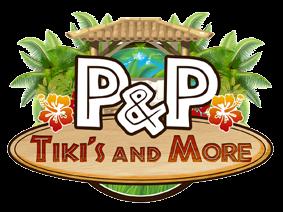Matters Of The Heart
CVI provides excellence in cardiovascular care


CVI provides excellence in cardiovascular care

Area health experts answer common questions

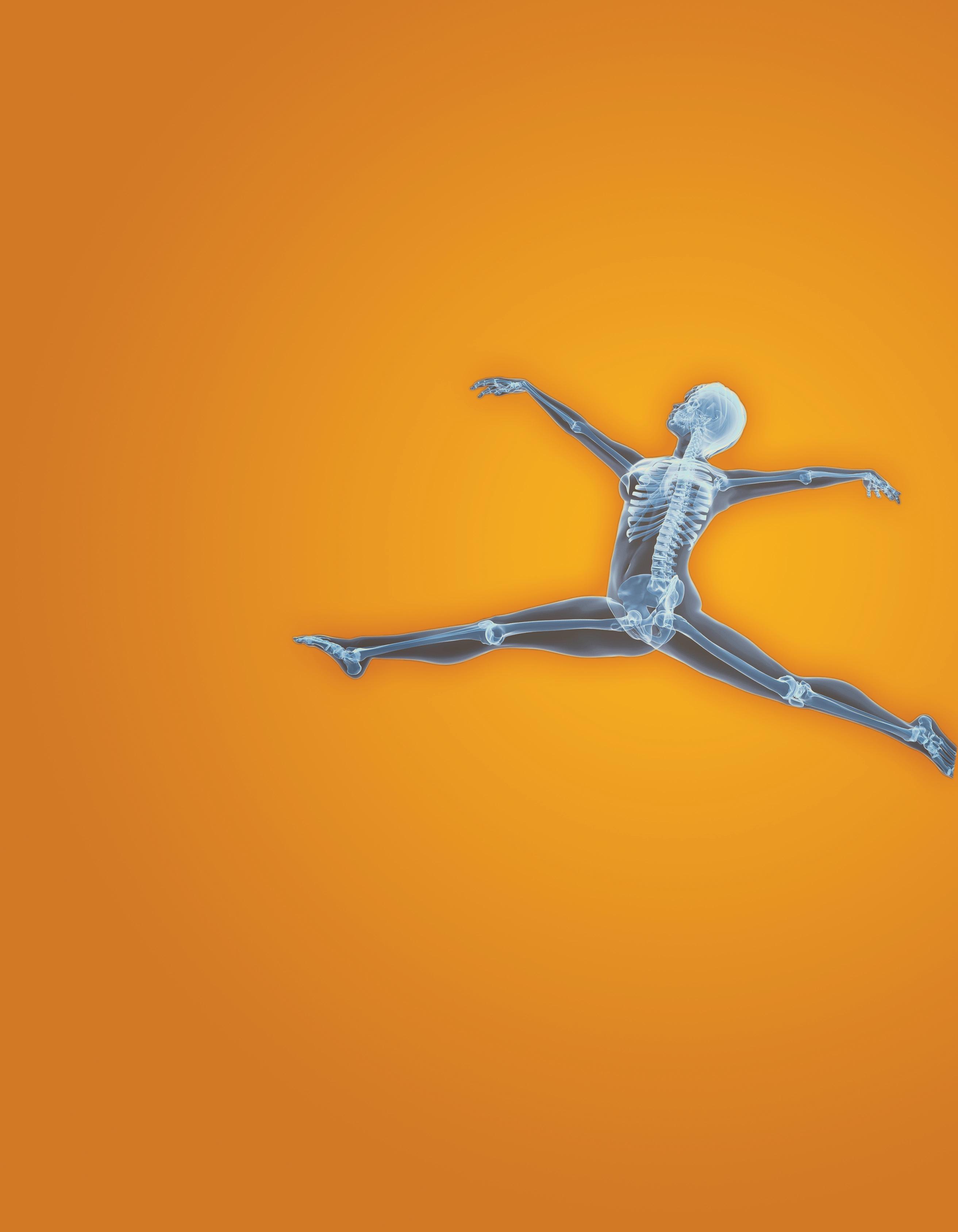


PET/CT provides remarkably detailed real-time images of the body’s anatomical, functional and metabolic activity, allowing easier and more accurate analysis, diagnosis, treatment and monitoring of issues of the head, limbs and body than PET or CT imaging alone. Our highly advanced and accurate PET/CT system represents a big leap forward in technology – and in the quality of your care.

OCALA
TIMBER RIDGE
THE VILLAGES
LECANTO


Bud Conklin beat prostate cancer with the help of advanced technologies, like RBOI’s Calypso 4D Localization Treatment.


Not many things slow Bud Conklin down. In his 60s, this Air Force veteran still hits the gym regularly and completes a weekly 20-mile bike ride. So when he was diagnosed with prostate cancer, he sought out the most advanced and efficient treatment available. After discussing his options with RBOI cancer specialist Dr. Bennett, Bud chose the high-tech Calypso treatment, which works like a GPS system in the prostate to optimize radiation targeting and minimize side effects. Bud is now cancer free and proud to say he didn’t miss a beat in his fast-paced life. We helped Bud write his success story. Let us help write yours.

We’re committed to making a difference.
When you live life “on the go,” you don’t want chronic joint pain to slow you down. That’s why Ocala Health takes a leading-edge, comprehensive approach to the treatment and rehabilitation of joint pain – designed to return you to maximum function as quickly and safely as possible. Our exceptional outcomes and shorter average length of hospital stay is among the best in the country.

Highly trained board-certified orthopedic surgeons and a multi-disciplinary patient care team work with you and your primary care physician to develop a customized treatment plan. If you need surgery, we offer the most advanced surgical procedures using the latest technologies, including minimally invasive techniques with the MAKO robotic arm.
To be connected with our award-winning team of physicians, please call 1-800-530-1188 or visit us at ocalahealthsystem.com.
We perform the following specialized joint surgeries:
• Knee replacement
• Partial knee replacement
• Knee resurfacing
• Hip replacement using both anterior and posterior approach
• Shoulder replacement
• Reverse shoulder replacement
• Arthroscopic sports medicine
›› PAGE 20
Integrative medicine, such as massage and acupuncture, provides another health care option for patients. › By JoAnn
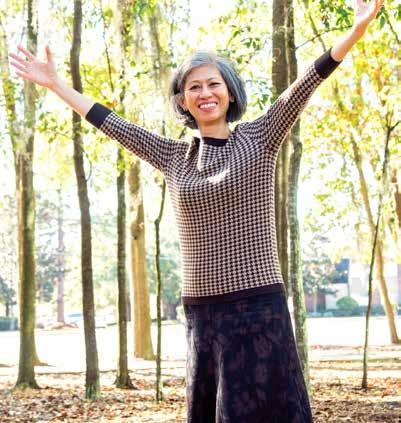 Guidry
Guidry
› PAGE 24
Heart-healthy eating doesn’t have to be trying or painful—at least not with these delicious foods in your diet. › By Brett Ballantini

› PAGE 28
Ocala’s medical and health-related community is vast and knowledgeable. So, when we wanted to get some important questions answered regarding a range of topics, who better to ask than the pros who know these matters better than anyone.

› PAGE 34
When your heart health matters the most, turn to the professionals at Cardiovascular Institute of Central Florida.
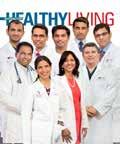
› PAGE 36
Three weekend getaways for you and your girlfriends. Who’s in?
By
Cealia Athanason› PAGE 7
TRENDS | NEWS | PEOPLE
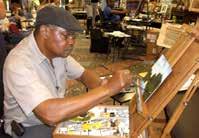 By Angelique Anacleto, Laurel Gillum and Melissa Peterson
By Angelique Anacleto, Laurel Gillum and Melissa Peterson
› 8 On the road with the Highwaymen.
› 10 What to do this month.
› 12 A bit about business.
› PAGE 13
INSIGHT | ADVICE | SOLUTIONS
By Laurel Gillum› 14 Body oddities.
› 16 Shot solutions.
› PAGE 41
NUTRITION | FITNESS | BEAUTY
By Angelique Anacleto and› 42 Organic options.
› 44 The eyes have it.
Laurel Gillum
Jernigan› PAGE 45
MIND | SPIRIT | FINANCE
By Laurel Gillum and Katie McPherson› 46 Stop complaining!
› 47 Best. Sleep. Ever.
› 48 Put down the phone.




HEALTHY LIVING MAGAZINE has brought together a group of medical experts and community leaders to serve on our advisory board and share their expertise and insight with our readers.
Craig Ackerman Public Information O cer FLORIDA DEPARTMENT OF HEALTH IN MARION COUNTY
Ashley Hersey Clinical Liaison KINDRED HOSPITAL OCALA
Ashley Cauthen, M.D. Cosmetic And Clinical Dermatology MIDSTATE SKIN INSTITUTE

Derek Farr, D.O. Orthopedic Surgeon TWIN PALMS ORTHOPEDICS
Joseph Foster Senior Solutions Director SUPERIOR RESIDENCES OF LECANTO


Carmen M. Hernandez Health Education Program Manager FLORIDA DEPARTMENT OF HEALTH
Michael Holloway, M.D. Physician-Directed Weight Management & Medical Aesthetics LIFESTYLE SOLUTIONS MEDSPA
Mark Jank, M.D. Ophthalmology OCALA EYE



Linda M. McKenna Director of Professional Relations
CHAPTERS HPH HOSPICE
Amy McLaughlin, APR, CPRC Director, Marketing & Communications SEVEN RIVERS REGIONAL MEDICAL CENTER

Katie Myers, APR Director Of Marketing And Public Relations CITRUS MEMORIAL HEALTH SYSTEM
Navinderdeep Nijher, M.D. Plastic Surgery OCALA PLASTIC SURGERY


Chris Okonkwo, M.D. Pediatrics CHILDREN’S HEALTH OF OCALA

Amanda Ostrom Director of Marketing and Communications RADIOLOGY ASSOCIATES OF OCALA, P.A.





Jayanti Panchal, M.D. Internal Medicine And Medical Weight Management SUCCESS BY DESIGN
Carolyn Reyes, MPA, M.Ed. Community Liaison, Citrus & Hernando Counties COMFORT KEEPERS


Brittney Marthaller Director, Marketing & Public Relations OCALA HEALTH
Meghan Shay, CFRE Director Of Public Relations And Development THE CENTERS

PUBLISHER

Kathy Johnson kathy@healthylivingmagazines.com
OFFICE/PRODUCTION MANAGER
Cynthia Brown art@healthylivingmagazines.com
EDITORIAL
EXECUTIVE EDITOR
Karin Fabry-Cushenbery karin@healthylivingmagazines.com


MANAGING EDITOR
Melissa Peterson melissa@healthylivingmagazines.com
ASSOCIATE EDITOR & SOCIAL MEDIA SPECIALIST
Cealia Athanason cealia@ocalastyle.com
CONTRIBUTING WRITERS
Angelique Anacleto
Brett Ballantini
Jim Gibson
Laurel Gillum
JoAnn Guidry

Bonnie Kretchik
Cynthia McFarland
Katie McPherson
ART art@healthylivingmagazines.com
CREATIVE DIRECTOR
Jessi Miller Castro
GRAPHIC DESIGNERS
Christina Geiger
Kristy Taylor
PHOTOGRAPHERS
Ralph Demilio
John SheilaJernigan fotolia.comHartley
SALES
DIRECTOR OF SALES
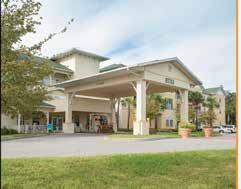
Dean Johnson deanjohnson@healthylivingmagazines.com
SALES MANAGER
Sharon Morgan
ACCOUNT EXECUTIVES
Lori Tani
Skip Linderman
Peggy Sue Munday
Liza Fritz
Tammy Walters
Dawn Anderson
DISTRIBUTION
Dave Adams
Debra McQueen
Rick Shaw
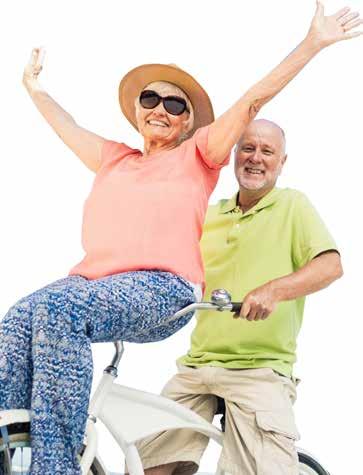
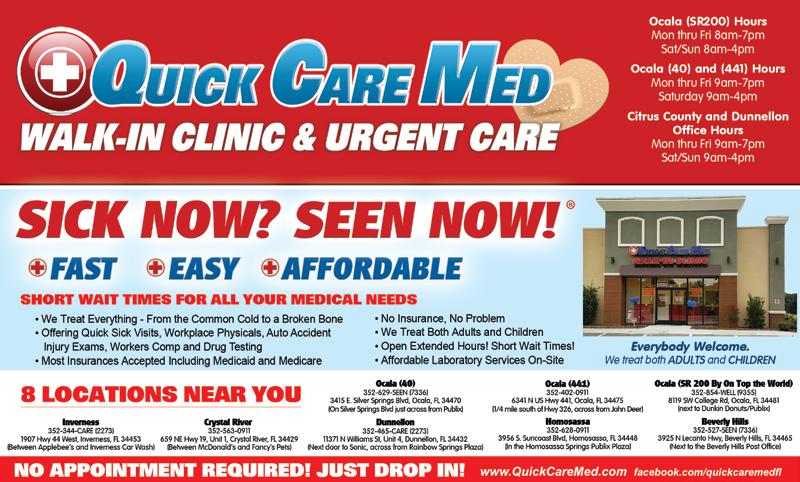
The Ocala Downtown Market can only be described as our very own melting pot where artists, farmers and craftspeople come together under one roof to sell their latest creations and wares. For anyone whose weekends are just too hectic for a trip downtown, the market is now also open on Wednesdays from 3-7pm in addition to the regular 9am-2pm Saturday hours. You can also visit the newly designed website at ocaladowntownmarket.com for the latest news and details. Here, you can preview a list of vendors and the dates they will be at the market. Here’s a sneak peek at what’s to come: Check out Into the Wild Jewelry on Feb. 11 or the Lotus Asian & Natural Food Market on Feb. 25. The website also keeps you up to date on upcoming events and seminars. Previous events have included a chef demonstration featuring Chef Randal White.

Dab and pause, dab and pause. While at Paint The Town Citrus art gallery’s fundraiser in the Crystal River Mall, two Florida Hall of Fame Highwaymen painters, Robert “R.L.” Lewis and Curtis Arnett, demonstrate their well-honed landscape painting abilities. Poised at their respective easels, both men meditatively dip at paper palettes, swiftly and easily filling their canvases with idyllic scenes of native trees swaying languidly against rippling rivers peppered with the occasional spray of water fowl. Even while carefully composing, they chatter with enthusiasm. While Lewis genially relays stories of early days, Arnett leads fascinated onlookers through his preferred brush techniques.
The Citrus County Democratic Executive Committee (CCDEC), which organized the event, helped raise money through a silent auction and a ra e to win both Highwaymen’s paintings. Proceeds totaling $495 went toward Citrus County Blessings, a non-profit organization devoted to supplying weekend meals to children who receive subsidized school meals.
Event interest was largely due to Lewis’ and Arnett’s celebrity, which draws eager art fans to their numerous appearances throughout Florida. Many gravitate to their hard-won struggle and the regional genre’s sustaining success, which dates back to the segregationist Jim Crow South of the 1950s and 1960s.
During a time when most AfricanAmerican families were destined to work in citrus groves, nine Fort Pierce painters ingeniously taught themselves and mentored each other on technique. At times, they worked in a swift factoryline fashion, using leftover oil paints on inexpensive Upson board. But because they were excluded from formal sales at galleries or art shows during this racially turbulent period, the Highwaymen sold their still-wet pieces from their car trunks along the southeastern coast on US Highway 1 and Florida A1A, thus earning their Highwaymen nickname. Other times, entrepreneurship
steered them selling door to door. Spanning from the 1950s through the 1980s, 26 artists are recognized as original Highwaymen, and their more than 200,000 pieces are highly collectible.

While Lewis likewise recalls painting Indian River Lagoon scenes on Upson board and selling his landscapes in 1967, his path led him to college and teaching art for 32 years. Inspired by neighborhood artists, Arnett similarly began selling pieces for $25 from his car at age 17 and then later increased to $300-$1,000 per piece after discovering the precise, quick-drying results of acrylic paints.

Early painting methods have given way to include today’s advanced technology. At 75, Lewis and his son, Robert Lewis, III, field several requests at his gallery in Cocoa for commissions via email attachments. Says Lewis,
“I get email attachments saying, ‘Dear Mr. Lewis, I eat, live and work in the middle of this picture. Can you paint it?’ They take a picture in their backyard, and I can put it on a piece of canvas for them,” he says. Works now incorporate various animals, cowboys and buildings into Southern scenes. And his emphasis on preserving Florida’s natural history has helped Lewis to grow impressive commissions for the Department of Agriculture and Florida Cattlemen’s Association.
Arnett’s newest routine involves cleverly viewing inspirational outdoor shots directly from his digital camera to his TV, which he later uploads and archives onto a disc. The 66 year old, who lives in Lee, prefers to paint sights from around Orlando and Tallahassee.
“I like the cypress trees, the rivers. But I also like the cabbage farms and the oak trees,” says Arnett. He also has nostalgic plans to recreate his grandparent’s cotton and tobacco fields.
For both Highwaymen, dedication to their craft these days can necessitate asking prices as high as $7,000 for larger works.
In true Highwaymen style, Lewis and Arnett still log their share of miles on the road. “Let me check my appointment book” is a common refrain as they travel each month for appearances around the state.
Lewis darted from Tallahassee to Orlando’s Orange County Regional History Center to a Clermont antique mall to a Mount Dora Highwaymen art show this past January.

Arnett also points to an upcoming Fort Pierce Highwaymen Trail event on February 18, plus a March 18-19 fundraiser by the Pompano Beach Historical Society and Sample-McDougald House Preservation Society.
Florida continues to celebrate homegrown Impressionists who make it their mission to depict and capture the timeless essence and natural beauty of the state’s endangered wetlands. Currently, paintings are showcased in Tampa’s Florida Aquarium
and Tallahassee’s Museum of Florida History and Florida Artists Hall of Fame.
“More people are finding out about [Highwaymen art]. And the more people find out about us, the more we’re asked to come to di erent places and show,” says Arnett. “That’s one of the reasons why it’s continuing to survive like this.”
Check out Amazon for a handful of Florida Highwaymen books or rllewis.com for Lewis’ biography, A Journey Through the Eyes of an Original Highwaymen Artist, $29.95. Watch two PBS documentaries via Vimeo at thefloridahighwaymen.com.
• The Highwaymen: Florida’s Outsider Artists (2002), narrated by Good Morning America’s Spencer Christian
• The Highwaymen: Legends of the Road (2007)
Walk the illuminating 10-stop Highwaymen Heritage Trail in Fort Pierce, and experience where it all began. Visit thehighwaymentrail.com for details.
What better way to appreciate Highwaymen art than to paint along with a legendary artist!
Curtis Arnett will be instructing a painting class at Paint The Town Citrus, 1801 NW US Highway 19 in the Crystal River Mall, on April 22 from 12-5pm. He will explain how to finesse acrylic paint on 12-inchx16-inch canvas board. The fee for this five-hour class is $100 per person, including food and beverages. Call (352) 601-1344 or email paintthetowncitrus@gmail.com, as seating is limited.
Additionally, the gallery sells Highwaymen paintings by Arnett, Lewis, Willie Daniels, Rodney Demps and Chico Wheeler.

Go for a walk at the Greenway
GROUNDHOG DAY
Organize monthly bills, shred unneeded documents

Prepare a garden— spade a plot large enough to grow a few vegetables

Ocala’s First Friday Art Walk
Prep and freeze meals for upcoming busy nights
Schedule an upcoming night out with friends (See The Fantasticks at OCT through Feb. 26)

Strength Training
Chair Yoga at Blissful Life Corporation (Every Wednesday at 10:30am)
Strength Training
Start reading a new book
Valentine’s Day
Date night
Make your own garden compost
8th Annual Five Points of Life Kids Marathon at the College of Central Florida
The Huracan 300 Plus at Santos Trailhead
6-9pm
Family movie night: Mary Poppins
16th Annual Valentine’s Day 5K at Silver Springs State Park
Hernando County Farmers Market
(Every Saturday, 10a-3pm)
Strength Training
Blueberry Horseshoe
5K at Lambholm South
Whispering Pines
12-hour/6-hour Run/ Walk, Inverness
PRESIDENT’S DAY
Family game night
Clean out one closet and donate unwanted items
Horseback riding
Making Strides Against Breast Cancer Craft Night (352) 7325982 for details
Visit Ocala Downtown Market (Every Saturday 9a-2p and Wednesday 3-7pm)
Strength Training
Start a yard sale bin
Find a volunteer opportunity and schedule a one-day commitment for next month
warm & cozy Spiced Caramel Apple Cider

Wash bedding throughout the house
Plant bean, pepper, cucumber, tomato and squash plants
Home Improvement Expo at the Circle Square Cultural Center
Bake treats with the kids

4 cups apple cider
1⁄4 cup caramel topping
1 tsp McCormick Apple Pie Spice
2 tsp McCormick Pure Vanilla Extract
Bring apple cider, caramel topping and apple pie spice to simmer in medium saucepan. › Stir in vanilla. › Pour into serving cups. › Serve topped with whipped cream, additional caramel topping and apple pie spice, if desired.
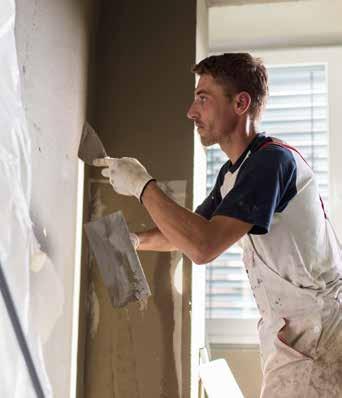



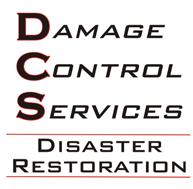
Oak Hill Hospital is proud to announce the promotion of Susan Cooper, MSN, BSN, RN-BC, as its new vice president of cardiac services. Cooper was promoted from a previous leadership position as director of its neuro/ tele unit and newly formed Clinical Decision Unit (CDU). Cooper joined Oak Hill Hospital in 2013, bringing with her extensive nursing and leadership experience in cardiovascular patient care. While director of the neuro/ tele and CDU units, she led her team to honors by receiving the HCA Med-Surg Excellence Unit for Distinction Award in 2015.


Ocala Health recently began its $40 million construction on the West Marion Community Hospital campus. A groundbreaking ceremony for the expansion project was held in December. Ocala Health senior leadership and members of the Ocala Health medical sta ; Carl Zalak, chairman of the Marion County Board of County Commissioners; Kevin Sheilley, president and CEO of the Ocala/Marion County CEP; and local government representatives attended the event. This expansion, along with the additional 24 patient rooms that opened in April 2015, will nearly double the facility’s bed count in approximately two years. This investment by HCA, Ocala Health’s parent company, represents a nearly 42,000-square-foot addition to the 14-year-old facility.
Fifty-eight Ocala-area veterans recently received free dental services from Oakridge Dental Care. Dr. Christopher Bonesteel and team provided free oral health care to local veterans as part of its Veteran’s Free Dentistry Day, a program initiated to provide dental care to the growing number of veterans without dental insurance. The doctors and team members provided over $32,700 worth of dentistry, including extractions and cleanings to veterans throughout the day.
“Unfortunately, many veterans do not see a dentist on a routine basis,” said Dr. Bonesteel. “We were thrilled to open our doors to those in our community and volunteer our time and resources to make sure they received the care they need and deserve.”

Two College of Central Florida programs, physical therapist assistant and emergency medical services, are among the best in the nation, according to accreditedschoolsonline.org. Ranked third in the nation among four-year colleges, CF’s physical therapist assistant program takes about two years to complete and currently boasts a 100 percent graduation rate and 100 percent employment rate.

CF’s emergency medical services program, ranked fifth in the nation among four-year schools, takes 15 weeks to complete and leads to certification as an EMT.
Each year, Comfort Keepers launches a “Feed Seniors Now” food drive, which raises awareness about senior nutrition issues in our community, collects food and toiletry items and chooses a food pantry that focuses on seniors to receive what they collect.
This year, Comfort Keepers chose Marion Senior Services to be the recipient of the items collected. At the start of this drive, the food pantry at Marion Senior Services was in a “critical need” status. Throughout this drive, more than 26 agencies and individuals provided Marion Senior Services with over 2,653 pounds of food.
“This campaign enabled our sta to provide food to our most vulnerable and at-risk seniors and was especially helpful in the emergency preparations for Hurricanes Hermine and Matthew,” said Jennifer Martinez, Marion Senior Services executive director.

Cranberry juice has been considered preventive medicine for urinary tract infections (UTIs) by women for many generations. Unfortunately, a study published in the Journal of the American Medical Association may have just debunked this myth. When 147 women—31 percent of whom already tested positive for bacteria plus pyuria in their urine— were asked to take two cranberry capsules daily or a placebo, the results were surprising. The team concluded there was no di erence in the presence of bacteria between the cranberry group and the placebo group—nor was there any substantial di erence in the prevention or development of a UTI between the groups.
Dr. Lindsay E. Nicolle spoke out on the subject, encouraging women to drink “plenty of fluids”—but not necessarily cranberry juice—to rinse toxins from the body during a UTI and was adamant that cranberry products should no longer be recommended as a cure.

Next time you eat your ice cream too fast, yell out “sphenopalatine ganglioneuralgia.” That’s the scientific term for a brain freeze. A brain freeze is a short-term headache linked to rapid consumption of cold food or drinks. When something cold touches the roof of the mouth, the sudden decrease in temperature stimulates nerves to cause rapid swelling of blood vessels in an attempt to bring temperatures back up. Next, the dilation of blood vessels trigger pain receptors, which release pain-causing prostaglandins, increasing your sensitivity to further pain and producing inflammation while sending signals through the trigeminal nerve to alert the brain to the problem. No worries, though. The pain is short-lived. All that for a sundae? The answer is always yes.

Ever experience a giant whi of nostalgia? Us, too. Maybe it’s the perfume your mom used to wear or the apple pie your grandma used to bake—no doubt, certain smells can spark a flurry of emotional memories. After a smell enters the nose, it travels through the cranial nerve through the olfactory bulb (the emotional center of the brain), which helps the brain process smells.

As a member of the limbic system, the olfactory bulb has access to the amygdala, which also plays a role in emotional memories. This would explain why memories associated with smells feel nostalgic and emotional, rather than memories associated with words that feel concrete and detailed.


Yawning occurs as early as 20 weeks after conception. Hmm, wonder if the mother’s yawn is in sync?
The theory that we yawn to supply our brain with more oxygen has been debunked. It does, however, slightly lower the temperature of your brain. The motion of opening your jaw wide sends more blood up to your brain, while the inhalation of cool air makes that blood flow relatively cool. Yawning behavior decreases when ambient air is warm. Why then, do yawns spread like wildfire? Empathy plays a big role. This theory is supported by evidence gleaned from MRIs of the brain. Now that we are all yawning, let’s proceed. what make us sneeze? Sneezing is considered a reflex. When imposters such as germs, dust, pollen, animal dander or pollutants infiltrate the lining of the nose, the brain sends out a signal to get rid of them. That triggers a deep breath, held in the lungs. Thus, the chest muscles tighten and pressure builds. The tongue pushes against the palate, forcing breath to come out fast through the nose—achoo!
Weird sounds, weirder smells, wrinkled fingers— why are people so strange? Read on to find out a little bit more.
This one is straightforward. Your subconscious mind is always one step ahead of you. When you tickle yourself, no matter how cleverly you try to disguise it, it is always going to be expected.
Ancient Romans used tickling as corporal punishment. They tied o enders down, soaked their feet in salt and had goats lick it o . Yuck, right?

If you’ve ever watched Marley and Me, you know exactly what we are talking about. There’s nothing worse than that feeling you get in the back of your throat when you are sad or on the verge of crying—especially when you know nothing is physically there. Apparently, this is a counter-reaction to the body’s automatic nervous system. When humans are exposed to stressful situations, the body automatically increases blood flow to vital organs and muscles. The vocal folds are opened, allowing your lungs to receive more inhaled oxygen than normal. Although this process is beneficial in real stressful situations when you would need more oxygen, other times not so much. Our advice? Just give in
A common assumption is that wrinkling is the result of water passing into the outer layer of the skin and making it swell up. The truth may surprise you. When your fingers are wet and wrinkled, they provide better gripping powers. Wrinkled fingers may have helped our ancestors gather food from wet vegetation—or wrinkled toes, for better footing in the rain.


you voluntarily ask someone to scare you silly, you might have a case of the hiccups. These annoying gasps for air usually occur when a spasm contracts the diaphragm. This spasm causes an breath that is suddenly stopped by the closure of the vocal cords. This closure causes the “hiccup” sound. Usually, they only last a few minutes to a couple hours. If they last any longer—well, looks like you need to enlist a scarier person’s help.
American Charles Osborne experienced the most extreme case of hiccups ever recorded. They lasted 68 years, from 1922 to 1990. That’s an estimated 430 million hiccups!
tell the truth. “Don’t say the shot won’t hurt because kids will learn you’re lying and you can lose their trust,” says Margaret Fisher, M.D., recent chair of the Section of Infectious Diseases for the American Academy of Pediatrics. Be honest and remind them that it might hurt but only for a few seconds. Being in the know will greatly reduce pre-shot jitters. be tactful. If you talk about the subject too much, your child may become anxious. Ari Brown, M.D., author of Baby 411 recommends that you don’t tell your child about a shot too soon before the actual doctor’s visit. She reasons if they have the time beforehand to anticipate the visit, anxiety will build up. help prevent the pain. There are various tactics that people swear by to help lessen the pain that comes with a vaccination. The coughing method has received some national attention lately. Here’s how it works: Having your child let out a big cough at the exact time of a shot provides a distraction, and the sensory stimuli of the sound and feeling of the cough— per the British
Journal of Plastic Surgery—may compete with the pain, making it practically unnoticeable. This method apparently works because upon the initial cough, blood pressure is momentarily increased, and hypertension is known to reduce pain perception. For the full e ect, it’s important for the cough to coincide with the shot. If there are multiple injections, a cough can be repeated for each. take it easy. Lindsay Uman, Ph.D., a clinical psychologist at IWK Health Centre in Canada has noted the parallel between parental behavior during vaccinations and the amount of pain and anxiety their child experiences at a doctor’s visit. If you relax, maybe they will, too. She explains that a simple “it’s OK” or “don’t worry” is often enough to put a child’s mind at ease. If your child is simply having a tantrum, stepping out of the room to allow the nurses to do their job may help. Some children, however, su er from a more serious fear of needles and may need more reassurance. Hold or hug them in a comfortable position. Most pediatricians will accommodate the situation to the best of their ability. For example, instead of administering four separate shots by one nurse, two nurses could administer the shots simultaneously, resulting in two pricks instead of four.
Incentive for an easy trip to the doctor may be a promised ice cream cone or trip to the bowling alley. Discussing these options on the way to the doctor may keep your child’s mind o what’s to come.

If your kids (or yourself for that matter) cringe at the thought of getting a shot, read on. Here are some tried-and-true methods for making that quick pinch more tolerable.




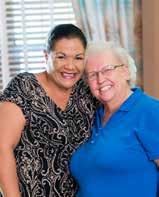
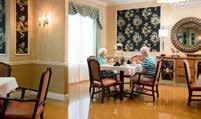
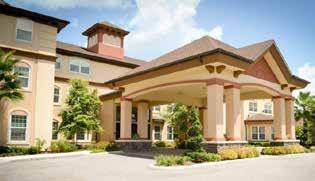



Many people in our community live their lives based on a deeply felt faith—“the substance of things hoped for, the evidence of things not seen” (Hebrews 11:1). Such faith allows people to see possibilities where others perceive only problems, to believe that blessings can be born of even the most trying times. It gives the confident assurance that all things serve a higher purpose, both here and hereafter. And it allows ordinary people to do extraordinary things.
For hundreds of children in Marion and Citrus Counties, their futures depend on the faith of others. These children have suffered trauma, abuse and neglect. They need safe foster and adoptive homes where they can be shown a loving way of life they have not seen but have long hoped for. The greatest need is for people to step out in faith for children ages 9 to 15, the critically formative years when we build our foundation for life.
What action does my faith require? That is the key question that all faithful people must ask themselves, because as the

Bible tells us, “faith without works is dead” (James 2:20). For those with sincere religious beliefs, one of the greatest opportunities to put their faith into action is to provide a home for a child who has suffered. As one local pastor put it, “Foster parenting and adoption are acts of God’s love to those who have not been loved.”
Those of us who are a part of the faith community must understand the Biblical mandate to care for others, especially children who find themselves in distress. Our faith compels us to love and nurture those who have nothing to give in return. This mandate is not defined by age or life situation, and it includes children who may be older or may seem to be more challenging. These young people need to know that their lives have meaning and purpose. What greater reward could there be than knowing that you helped restore hope in a child who has lost all faith in the future?
Are you called to foster or adopt? How can you come alongside and provide support for those who are called to foster or adopt? Not everyone is called to do the same thing, but if our faith is strong, it will drive us to consider what role we must play in meeting this great need.
Please at least explore what role you are called to fill in the life of a child. Call Paula Mealy of Kids Central, Inc. at (352) 387-3487, or email her at Paula.Mealy@KidsCentralinc.org. For more information, you can also visit KidsCentralFosterParents.org


Kids Central is the nonprofit lead agency charged with caring for the abused, neglected and abandoned children in Citrus, Hernando, Lake, Marion and Sumter Counties.











 BY JOANN GUIDRY
BY JOANN GUIDRY
At its heart, integrative medicine is about collaboration.

Centered on the patient-practitioner relationship, integrative medicine focuses on the whole person while making use of all evidencebased appropriate therapeutic approaches, health care professionals and disciplines to achieve optimal health and healing. This can include combining state-of-the-art conventional medical treatments with complementary healing systems and therapies, such as acupuncture, yoga, tai chi, massage and meditation.
Although the awareness of integrative medicine has grown in recent years, it is not a new field. The Academic Consortium for Integrative Medicine & Health was established in 1999 with eight founding members. Today, the organization, which is comprised of academic health centers and health systems in North America, boasts 69 members. Its membership roster includes such high-profile institutions as Duke University, Mayo Clinic, Harvard University, Cleveland Clinic, Stanford University and the University of Arizona.
The University of Florida Health System’s Integrative Medicine Program, which recently marked its three-year anniversary, is also an ACIMH member. The program provides in-patient care at UF Shands Hospital and an outpatient clinic at the UF Health Medical Plaza.
Integrative medicine, such as massage and acupuncture, provides another health care option for patients.Dr. Irene Estores, Medical Director of UF’s Integrative Medicine Program Photo by John Jernigan
“Integrative medicine has recently become a cultural buzz term. But in its basic form, it’s been around for centuries,” says Dr. Irene Estores, who serves as medical director of the UF Integrative Medicine Program. “Integrative medicine takes into account body, mind, spirit and lifestyle. The patient-practitioner relationship plays a critical role. It’s a collaboration of all the pieces of the health care puzzle.”
Estores’ medical specialty is physical medicine and rehabilitation, having completed her residency training at Johns Hopkins Hospital and Sinai Hospital. She completed her integrative medicine fellowship at the University of Arizona Center for Integrative Medicine, the nationally recognized program founded by Dr. Andrew Weil, who is considered a pioneer in the field. Estores is also a medical acupuncturist, having received her initial acupuncture training at the University of Miami Center for Complementary and Integrative Medicine.
“We treat outpatient and inpatients in the UF program that range from those who are relatively healthy to those in the end stage of cancer,” says Estores. “People also seek treatment for various quality of life issues, like stress, anxiety and chronic pain. Integrative medicine, which is not condition specific, can address all these issues.”
At the UF Integrative Medicine Program outpatient clinic, patient assessments are performed by a physician with training and experience in integrative medicine. The physician obtains a full medical history, performs a physical exam and also assesses the patient’s emotional, mental and social well-being. A treatment plan is then developed in collaboration with the patient. Recommendations may include the use of dietary supplements and botanicals, as well as changes in eating and physical activity. Mind-body procedures such as acupuncture and massage may also be
recommended. In addition, referrals may be made to practitioners of other healing systems, such as traditional Chinese medicine, Ayurveda (a holistic medicine system from India) and homeopathy.

“At the outpatient clinic, we o er massage and medical acupuncture,” says Estores, who practices medical acupuncture. “We base our recommendations on scientific evidence. One modality works better for a certain condition or health goal, while another is more appropriate for a di erent situation. That is why the assessment is important and why the practitioner-patient relationship is even more important. We have a better chance of achieving the health goal by working together.”
Estores notes that “while some health insurance companies do cover the cost of massage and acupuncture sessions, many


other complementary modalities are not covered. Patients then have to pay out of pocket, and this is a health care choice.”
But Estores is hopeful that these barriers can be overcome and is optimistic about the future of integrative medicine.
“We are hopeful that integrative medicine will continue to grow as more people become aware of it,” says Estores. “We would like it to be available to as many people as possible as a health care choice.”
In-patient assessments are carried out by a registered nurse or practitioner with training and experience in integrative medicine. A treatment plan is developed in collaboration with the patient and their primary care medical team. Recommendations made to patients may
“Integrative medicine takes into account body, mind, spirit and lifestyle. The patient-practitioner relationship plays a critical role. It’s a collaboration of all the pieces of the health care puzzle.”
include massage, yoga, tai chi, qigong, meditation/relaxation and hypnotherapy, all of which can be done with the patient in the bed or bedside in a chair. Thanks to grants and benefactor donations, the complementary services are provided at no cost to the patients.
“The patient demand greatly outpaces our current sta of complementary practitioners,” says Lauren Arce, who serves as the UF Health Integrative Medicine nurse coordinator, managing the hospital-based services and the wellness center. “We have to limit the number of patients we are serving at any one time to about 20. We like to do two sessions per week per patient.”
The program’s priority focus is on adult and pediatric oncology, heart and lung transplant, cystic fibrosis and palliative care patients. Massage is the most requested complementary therapy, which is the specialty of licensed massage therapist Andrew Hix.
“Massage is a great tool to help patients coping with pain and illness to manage their pain and stress,” says Hix, who is also a tai chi and qigong practitioner. “Most patients are looking for some relief, some relaxation. The type of massage I practice is very light, very slow. I consider it a form of connective tissue and neuromuscular massage. Sometimes
I use a modified Swedish massage, using gentle compressions.”
Hix calls the work “very rewarding to help a patient and make their day just a little bit better.”
Arce adds, “We regularly survey our patients and have found that as high as 98 percent have a positive outcome with complementary therapies, would do them again and would recommend them to others.”
Massage: This modality involves manipulation of the muscles and connective tissues to enhance their function while promoting relaxation and well-being. In integrative medicine, sessions are structured around patients’ needs and goals, such as pain management, increased circulation and sensory-motor stimulation.

Acupuncture/medical acupuncture: An ancient Chinese healing practice, acupuncture is a method of encouraging the body to promote natural healing by inserting needles at very precise acupuncture points on the body. The modern scientific explanation is that acupuncture stimulates the nervous system, which releases chemicals into the brain, spinal cord and muscles, and influences the body’s internal regulation system. The National Institutes of Health states that acupuncture is proven to treat pain. Medical acupuncture is the term used to describe acupuncture performed by a doctor trained and licensed in conventional medicine and who has also received acupuncture training as a specialty practice.
Tai chi: It originated in China as a martial art and is often described as “meditation in motion.” It is a traditional system of lowimpact, slow-motion movements paired with deep breathing for physical, mental and spiritual health. The movements can be adapted or practiced while walking, standing or sitting.
Qigong: Pronounced “chi kung,” qigong is translated as “breath work” or “energy work.” Related to tai chi, qigong usually consists of breathing techniques combined with gentle, slow movement and focused intentions to help relax and mobilize the body’s flow of energy.
Yoga: A combination of breathing exercises, physical postures and meditation, yoga is used to calm the nervous system while balancing body, mind and spirit.

Meditation/relaxation: In meditation, the focus is on attention while suspending the streams of thought that normally occupy the mind. Relaxation refers to a group of techniques that combine breathing and focused attention to calm the mind while consciously producing the body’s natural relaxation response. The two modalities can be used separately or in tandem.
Hypnotherapy: Practitioners of hypnotherapy create a state of focused attention during which consciousness is altered and distractions are blocked. This enables people to focus deeply on one thing, promoting relaxation and reducing pain and stress. Some scientists believe that hypnosis causes the brain to release natural painkillers. Other scientists think hypnosis works through the unconscious mind and the power of suggestion.
UF Health System’s Integrative Medicine Program
UFHEALTH.ORG/INTEGRATIVEMEDICINE
(352) 733-0881
(352) 265-9355
National Institutes Of Health/National Center For Complementary And Integrative Health NCCIH.NIH.GOV
Academic Consortium for Integrative Medicine & Health IMCONSORTIUM.ORG


February is American Heart Month, a designation given to the month by the American Heart Association. Unfortunately, heart disease is the leading mortality factor for both men and women in the United States, responsible for one in four deaths.
But the good news is that by committing to a healthier lifestyle, making smarter choices and managing personal health, risks of heart disease are cut significantly.
In honor of American Heart Month and the idea that even small changes can contribute to a lifetime of heart health, here are some crib notes on the foods that can deliver it to you.


Asparagus is a “super veggie,” packing in betacarotene, fiber and folate. Better, and as with most vegetables, you can eat all you want, as asparagus clocks in at five calories per spear and 25 per cup.

No one is suggesting you pluck an avocado o the tree and chomp away. But there’s no reason that avocados can’t be a garnish or spread in many of your meals. For example, add a bit of avocado to a sandwich or salad to pump up the heart-healthy fats in your diet. Avocados are full of monounsaturated fat, which lowers LDL (bad) cholesterol and raises HDL (good) cholesterol in your body. Avocados also encourage the absorption of carotenoids like beta-carotene and lycopene, which are crucial for heart health.
Blackberries and blueberries are the best choice, but any berry you pick is full of anti-inflammatories and soluble fiber, reducing the risk of cancer and heart disease.
Be mindful of overall sugar consumption, but in particular oranges, papaya and cantaloupes are rich in fiber, magnesium, potassium and beta-carotene.
From sun-dried to pasta sauce and all forms in-between, there’s almost no way to eat a tomato that won’t provide heart benefits. No matter how you slice them, tomatoes pack plenty of lycopene, alpha- and betacarotene, and vitamin C.
6 chopping broccoli when you learn that the florets provide heaping helpings of fiber, calcium, folate, vitamins C and E, and potassium.

Lentils or chickpeas, black or kidney beans, no matter—all pack a huge punch of fiber, as well as omega-3 fatty acids, B-vitamins, calcium and soluble fiber.
Almonds and macadamia nuts are loaded with monounsaturated and polyunsaturated fats. Walnuts bring omega-3 fatty acids to the table. All nuts increase fiber in the diet and are a fabulous source of healthy fat.
Eating oatmeal at breakfast or as a snack fills you with omega-3 fatty acids, folate and potassium. Also,
it’s rich in fiber, which means you’ll feel fuller for a longer time. And as a superfood, oatmeal lowers LDL (bad) cholesterol levels and keeps arteries clean.
Although olive oil is not a food per se, as an oil, it can factor into almost anything you eat. Like an avocado, olive oil is packed with monounsaturated fats to lower LDL cholesterol and reduce the risk of cardiovascular disease.
The wonders of olive oil were confirmed by the Seven Countries Study of heart disease, a study of populations throughout the world. The researchers discovered that Greek men had a predisposition for high cholesterol, but few died as a result because their diet consisted of heart-healthy fats like those found in olive oil.

Extra-virgin or virgin olive oils are the least processed, so use them instead of butter for cooking.
11RedWine



A little dash of flaxseed provides a punch of phytoestrogens, fiber and omega-3 and omega-6 fatty acids. Grind or mill the flaxseed to provide the best health benefits, and from there, it’s a no-brainer. Sprinkle on top of cereal, oatmeal or salads.
Although spinach is much tastier out of the produce section or garden than a can, Popeye was onto something, for real. This leaf will make your heart go pitter-patter with plentiful potassium, fiber, folate and lutein. But don’t just circle the spinach bin at the market—any vegetable is going to give your heart greater health. The Physicians’ Health Study tracked 15,000 men without heart disease over a 12-year period. Those who ate at least two-anda-half servings of vegetables every day cut their risk of heart disease by 25 percent. Each additional serving of vegetables reduced risk by another 17 percent.

Yep,redwine canhelpimproveHDL thecholesterollevels.Butkeep ouncespourlight:uptoeightperdayformen,fourforwomen.
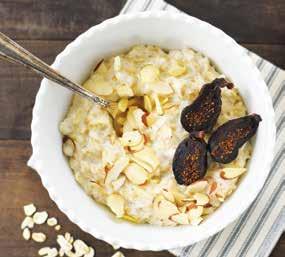
Recipe created by Foxes Love Lemons on behalf of Milk Means More Makes 1 serving
3⁄4 cup milk
1⁄2 cup old-fashioned rolled oats
1⁄8 teaspoon kosher salt
2 tablespoons ricotta cheese
2 figs, dried and halved
1 tablespoon sliced almonds
1 tablespoon honey
In microwave-safe bowl, stir together milk, oats and salt. › Microwave on high 2 1/2 minutes or until oats are tender and most liquid is absorbed. › Remove bowl from microwave; stir in ricotta. › To serve, top with figs and almonds, and drizzle with honey.
Makes 2 servings
1 ripe avocado
1 can (5 ounces) tuna packed in water, drained
1⁄2 cup finely diced celery
1⁄2 cup grated carrot
1⁄4 cup finely diced red onion
2 tablespoons Nakano
Rice Vinegar – Natural or Nakano Organic Rice

Vinegar – Natural

1⁄2 tablespoon olive oil
1⁄2 tablespoon Dijon mustard
1⁄8 teaspoon sea salt
1⁄8 teaspoon black pepper
16 brown rice crackers
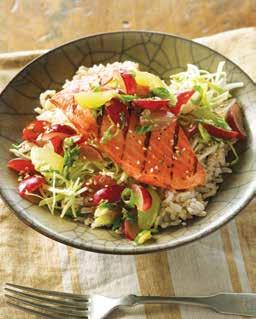
Makes 4 servings
4 boneless salmon fillets (3 ounces each), skin on kosher salt black pepper, freshly ground
2 tablespoons unseasoned rice vinegar
1 tablespoon grated fresh ginger
1 tablespoon honey
2 teaspoons extra-virgin olive oil
2 cups mixed green and red California grapes, halved
2 scallions, thinly sliced diagonally
4 cups hot cooked brown rice
2 cups finely shredded green cabbage
1 teaspoon sesame seeds
soy sauce, reduced sodium (optional)
Cut avocado in half, remove pit and scoop out flesh leaving thin wall of avocado. › Dice avocado flesh and set shell aside for serving. › In small bowl, combine tuna, celery, carrot, onion, vinegar, oil, mustard, and salt and pepper, and mix well.
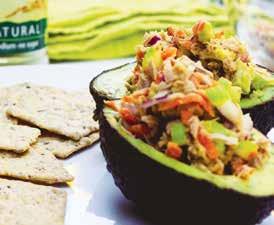
› Gently stir in diced avocado.
› Scoop mixture into avocado shells, and serve with brown rice crackers.
Heat grill to high, and oil grates.
› Sprinkle salmon with salt and pepper; set aside. › In small saucepan, combine rice vinegar, ginger, honey and olive oil, and bring to simmer over high heat. › Stir in grapes and scallions, and season with salt and pepper. › Set aside o heat. › Grill salmon, skin side up, 5-6 minutes.
› Turn, and grill another 2-3 minutes or until salmon reaches desired doneness. › Divide rice among four bowls, and top with cabbage and salmon. › Spoon grape mixture over top, and sprinkle with sesame seeds. › Serve with soy sauce, if desired.
Orthopedic surgeon
Dr. Derek Farr understands the importance of living a healthy, active lifestyle. That’s why he takes great pride in helping his patients get back on track to the life they want and deserve. Using Mako Robotic-Arm Assisted Surgery, Dr. Farr does just that with less pain, less down time and a faster recovery for his patients.


HOW DOES THE MAKO TECHNIQUE DIFFER FROM A TYPICAL HIP OR KNEE REPLACEMENT? At this time, the Mako is only used for total hip arthroplasty and partial knee replacement/ resurfacing, although there will be more surgical options in the near future. The advantage of the Mako plasty over a typical replacement surgery is that this technology allows the surgeon to be
more precise and exact. Surgeons do not have to rely on traditional techniques to determine the appropriate size and position of the prosthesis when they have the ability to calculate all of these variables through the Mako system.
HOW DOES THE MAKO SYSTEM WORK? WHAT IS THE TECHNOLOGY BEHIND THE PROCESS? It is quite amazing. Preoperatively, we obtain a CT scan of the hip or knee from which the computer will generate a 3-D image. Using that image,
we can virtually place the implant and optimize the position of the implant ahead of time. This ensures that the size and position is perfect, which eliminates the possibility of a leg length discrepancy and provides checks and balances to ensure the appropriate prosthesis was placed. During surgery, the Mako provides dynamic live feedback to ensure that the surgeon’s technique is flawless.
HOW DO YOU KNOW IF YOU ARE A CANDIDATE FOR A HIP OR KNEE REPLACEMENT?
WHAT
CARE OF THEIR JOINTS? A weekly exercise routine as well as a healthy diet are most important for joint health. Being overweight is a risk factor for premature wearing of the cartilage in the joints, which will lead to replacement surgery at a younger age.

GO? Historically, partial knee replacement surgery has been more complicated for the surgeon with less optimal outcomes for a patient. As a result, many surgeons have stayed away from this procedure. Until the MAKO was developed, there was not a system that could aid the surgeon and provide feedback to ensure precise implant positioning and placement. Performing a partial knee replacement or resurfacing using the Mako is a completely di erent picture. I am able to perform same-day surgery, which leads to shorter recovery and less pain reported by patients. Interestingly, up to 60 percent of patients who have received a total knee replacement could have undergone a partial knee replacement instead, especially with the Mako. It is important to provide patients with this information so they can make an educated decision about their health.
IS THERE
BENEFIT FOR A PATIENT TO HAVE THE MAKO SURGERY VS. TYPICAL SURGERY? Studies have shown that although orthopedic surgeons are good at making educated guesses about size of implant, placement and position, they are far from perfect. When a surgeon does not have this technology to guide them, the chance of mal-positioned prosthesis increases, leading to premature wear, possible dislocation, leg length inequality and increased pain. Computer-assisted surgery with the Mako robotic arm is more precise. Better-fitting implants lead to improved longevity of the prosthesis, less chance of failure and dislocation, shorter recovery time and less pain and complications. Studies have also shown greater patient satisfaction, which is most important.
Patients whose persistent hip or knee pain has a ected their quality of life or reduces their participation in activities are strong candidates for such procedures. They have often failed more conservative care options, such as physical therapy, bracing, injection therapy and anti-inflammatory medication.
WHAT DO YOU ENJOY MOST ABOUT YOUR LINE OF WORK? I obtain great satisfaction from improving a patient’s quality of life and helping them get back to activities they enjoy. The most rewarding gift I can receive is a picture of a patient who, after Mako surgery, can go back to climbing mountains, surfing, kickboxing, playing softball, weightlifting, horseracing, riding unicycles and ballroom dancing. I have many of these pictures in my o ce.
Dr. Derek Farr, DO EDUCATION/CERTIFICATION: Medical degree from Nova Southeastern University; orthopedic surgery residency, Michigan State University; sports medicine fellowship, Orthopedic Institute of South Florida. Board-certified orthopedic surgeon—Fellowship trained in Sports Orthopedics
YEARS IN PRACTICE: 9
Herb Santiago, Chef
, Physical Therapist
Life Care Center of Ocala, an inpatient and outpatient rehabilitation and assisted living facility, o ers 24-hour skilled nursing care and an in-house team of therapists who utilize stateof-the-art equipment. Listen in as Life Care Center’s compassionate team talks about how they have successfully provided top-tier rehabilitation care for patients in the community for more than 15 years.
At Life Care Center of Ocala, a rehabilitation center, a physical therapist can provide treatments five to seven days a week. (Most home programs are limited to three days a week.) The therapist has state-of-the-art equipment and the setting of a clinical rehabilitation gym to provide treatments, so the intensity of the treatments can be based on the patients’ physical abilities as well as their individual goals for recovery. Skilled therapy services are delivered by highly educated and experienced physical therapists, occupational therapists and speech therapists. These services are prescribed by a physician.
a speech therapist to develop a physicianprescribed diet that is tailored to the individual.
I’M INTERESTED IN LEARNING MORE ABOUT YOUR FACILITY.
Dr. Sherwin Roque, Physical Therapist
CERTIFICATION/EDUCATION: Doctorate of Physical Therapy
YEARS IN PRACTICE: 2
Herb Santiago, Chef
CERTIFICATION/EDUCATION: Culinary arts with licensure in food handling

HOW DOES DIET
Food provides the necessary energy and nutrients to fuel the body into a healing mode. At Life Care Center of Ocala, each patient is evaluated for a diet that is delicious yet rich in nutrients to improve health. A face-to-face interview with the patient helps gather specific information, including usual body weight, usual dietary habits and food likes and dislikes. This information is taken to the physician, dietician and sometimes
HOW DO I SCHEDULE A TOUR? Tours are welcome and encouraged seven days a week. To schedule a tour in advance and to speak with an expert admissions specialist, call (352) 291-4600. The tour will include an opportunity to see the rehab facility and its amenities, which include an ice cream parlor for patients needing extra calories. There are therapists available to answer specific health-related questions, and the admissions specialist will gladly answer all questions about insurance, Medicare eligibility and how to make a reservation.
YEARS IN PRACTICE: 18

2800 SW 41st Street, Ocala (352) 873-7570
lifecarecenterofocala.com
Medicare and most insurances accepted

A new year brings new changes for Dr. Ashley Cauthen and MidState Skin. From new doctors to new procedures, Dr. Cauthen fills us in on how MidState Skin continues to be a leader in clinical and cosmetic dermatology while staying up to date with the latest technology and trends.
WHAT’S NEW WITH MIDSTATE SKIN IN 2017? We are excited to announce the addition of a new dermatologist joining the practice, Dr. Doshi. He is board certified in dermatology and a fellowship-trained Mohs surgeon. Mohs surgery is a precise surgical technique used to treat skin cancer. During Mohs surgery, thin layers of cancer-containing skin are progressively removed and examined until only cancerfree tissue remains. This is exciting news for MidState patients because we will be able to perform this surgical technique in house and not have to refer patients to a di erent o ce. This addition is a result of our unwavering dedication to provide quality, ethical and compassionate care to our patients.
HAVE THERE BEEN ANY NEW COSMETIC DERMATOLOGY BREAKTHROUGHS RECENTLY? The launch of Kybella has o ered some exciting results in the cosmetic dermatology realm. Submental fullness, commonly referred to as ‘double chin,’ can be caused by aging, genetics or weight gain and often cannot be eradicated through diet or exercise alone. Kybella is scientifically proven to contour and improve the appearance of submental fullness resulting in a more youthful appearance. It consists of a series of injections directly into the unwanted fat
under the chin. Patients tolerate the procedure well, although most experience some transient swelling in the area. The cost starts at around $1,000.
I HEARD MIDSTATE IS NOW OFFERING TATTOOING. Tell me more! Well, you can’t come get the name of your sweetheart tattooed on your arm, but we are o ering permanent makeup tattooing, including individual brush stroke technique for eyebrows, which looks amazing! Most importantly though, we are o ering areola repigmentation tattooing for breast cancer survivors. This has been such a humbling experience being able to give these women back a sense of self confidence after they have fought what is sometimes the most di cult battle of their lives.
CERTIFICATION/EDUCATION: 2008 graduate of Florida State University’s School of Medicine; dermatology residency completed in 2012 at the University of South Florida, Tampa. Board certified in dermatology. Faculty member at the James A. Haley Veterans’ Hospital in Tampa.
YEARS IN PRACTICE: 5
More than a home away from home, Marion Oaks Assisted Living facility is helping those su ering from Alzheimer’s and dementia lead a joyful and satisfying life. The residents’ quality of life is the No. 1 priority, from the caring management to the loving nursing sta .

I originally began my career in the health field as a life enrichment coordinator/resident care aide. I began with entry level education in the field without a whole lot of knowledge about Alzheimer’s and dementia. As I worked with my residents and participated in classes on dementia, my curiosity grew and I began researching on my own how I could “connect” with my residents and enhance their quality of life. Through my research and studying, I learned about various types of dementia and the di erences between dementia and Alzheimer’s.
Growing up as a young child I witnessed some of the physical, emotional and mental e ects of dementia personally. Not only did this disease a ect my grandmother but our family as a whole. I couldn’t understand why my grandmother behaved as she did, why she couldn’t remember, etc. I had so many questions but no answers. It wasn’t until adulthood that I realized she su ered from dementia. From that moment on, the field of Alzheimer’s/dementia became my passion.
TELL US A LITTLE ABOUT THE ACTIVITIES AND BENEFITS OF A PATIENT LIVING ON A MEMORY CARE UNIT.
Purpose-built memory care communities create a lifestyle of comfort, security and purpose for our residents. Programs and activities are created to encourage current strengths and abilities, promote cognitive function, stimulate reminiscence and provide joy and meaning. Our sta members know what kinds of activities work best to create physical, spiritual, mental and social wellness for our residents. Programs are designed to meet their preferences and allow them to continue pursuing their hobbies. Alzheimer’s disease is an ever-growing concern, and until there’s a cure, it’s our mission here at Marion Oaks Assisted Living to provide our seniors with memory loss care and as much quality of life as possible.
The goal of life skill stations is to create small vignettes that help dementia residents spark old memories and create activities
that encourage interest, movement and interaction. I know this is a key feature that needs to be integrated to further support the quality of life for residents.
Tanya Shuler ADMINISTRATOR/EXECUTIVE DIRECTOR/ MANAGER
The firm of Cohen, Ashton & Miller will be holding a product test market event in your area. In order to introduce the latest technology in the field of digital hearing devices, during this event only, all hearing devices will be offered at tremendous discounts—making them affordable to the people who need them most.

In addition, to further demonstrate the incredible performance of these devices, we will be conducting a 3-day demonstration performed by trained representatives specializing in the latest in hearing technology. Receive a FREE Fiber Optic Otoscope Exam—a completely painless procedure that reveals and evaluates common hearing problems such as excessive wax buildup and damage to the ear drum, as well as a variety of other common hearing deficiencies. An audiometric hearing screening will also be performed, which is helpful to identify any other hearing difficulties and enables our technicians to determine if the newest personalized digital hearing devices will effectively correct such conditions.
During this 3-day demonstration and test market event, these representatives have been authorized to offer up to 50% off the manufacturers’ retail price during this event—serving to both increase product awareness in the marketplace and provide affordable devices to people with hearing difficulties.
It is the desire of NuTech Hearing to introduce these digital hearing devices to as many people as possible. We feel that this test market and introduction event is the perfect way to introduce these devices to people who otherwise may not know of the incredible technological advances being made today in the area of hearing correction. People could greatly improve their quality of life by having a special screening—free of charge—to experience for themselves what these devices can do for them.
As our way of saying “thanks” for stopping by and allowing us to introduce these new devices to you, you will receive a $10 GIFT CARD!
If you currently wear hearing aids or have difficulty hearing, you owe it to yourself to see what these products can do for you. Upgrades or trade-ins of your current device will be accepted, making this one of the best opportunities to affordably get the device that you need.
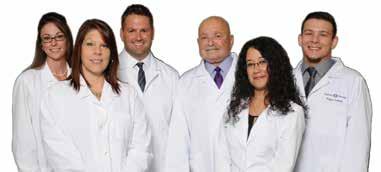
Numbers don’t lie. Approximately 79,400,000 Americans—that’s one in three adults—are living with cardiovascular disease.
Not only is cardiovascular disease the top killer in the United States, but that’s also the case around the world. According to the American Heart Association, 31 percent of all deaths globally were from cardiovascular disease, stroke accounted for 11.8 percent of all deaths and 16.9 million people worldwide had a first stroke in 2010.
When heart issues are a concern—whether for yourself or a family member—you want the best care possible. The board-certified providers and entire sta at Cardiovascular Institute of Central Florida know you want more than facts and competent care. You need the peace of mind that comes from conscientious, personal treatment that includes all aspects of health: physical, mental and emotional.
The team of highly experienced, boardcertified cardiologists at Cardiovascular Institute of Central Florida use the latest technological and medical advances available in cardiology today. But they are also aware that patients want to be understood, reassured and treated with respect. Each physician and sta member realizes that people have many options when it comes to health care. When you choose to put your trust in Cardiovascular Institute of Central Florida, they take that seriously.
In April 2015, Urban Cardiology, founded by partners and longtime boardcertified cardiologists Dr. Paul Urban and Dr. Premranjan Singh, merged with Cardiovascular Institute of Central Florida. This merger sought to provide patients with even more comprehensive care and ancillary

services in-house, and that’s exactly what it accomplished.
For example, the practice has its own cardiology catheterization lab in Ocala, which o ers a range of diagnostic and interventional cardiac procedures.

Cardiovascular Institute of Central Florida’s physicians specialize in prevention, diagnosis and treatment of all diseases of the heart. Services include cardiac wellness and prevention as well as diagnosis and treatment of coronary heart disease, valve disease, hypertension, CVD, heart rhythm conditions and congestive heart failure.
At some medical o ces, patients feel like they’re simply part of the process. That “lost in the shu e” experience doesn’t happen with the doctors and health care professionals at Cardiovascular Institute of Central Florida. Each sta physician takes the approach of developing a medical
partnership with the patient, working with their best interest in mind. They take time to educate patients to increase their comfort level and eliminate any surprises about a procedure.
“We listen to what our patients have to say, because they are more than just a number to us,” notes Dr. Singh. “We strive to present each patient with the best options for their cardiovascular medical care and work with them to select the option that works best for them.”
They are aware that patients want to be understood, reassured and treated with respect.Photography by John Jernigan
Continuity of care is vital anytime you’re dealing with heart issues. At Cardiovascular Institute of Central Florida, you’ll benefit from a customized treatment plan designed around your specific health needs. Electronic medical records facilitate quick and thorough treatment, whether you’re in one of their o ces or at a local hospital. CARDIOVASCULAR INSTITUTE OF CENTRAL FLORIDA › CVCIFL.COM
The practice has four locations in Ocala and The Villages, and all Cardiovascular Institute of Central Florida physicians have hospital privileges in Marion County.



A doctor referral is not necessary to call for an appointment. Self-referral is welcomed, and most forms of insurance are accepted. ICANL and AAAHC accredited. Call today to schedule your appointment.
The Cardiovascular Institute of Central Florida health care team includes:
› Shafeeq Ahmed, MD
› Ramil Goel, MD
› Siva Gummadi, MD, FACC
› Vijaya Koka, MD, FACC
› Jayanth Koneru, MD
› Hima Mikkilineni, MD, FACC
› Jigar Patel, MD
› Srisha Rao, MD, FACC
› Premranjan Singh, MD, FACC, FSCAI
› Paul Urban, MD, FACC, FSCAI
› Bridget Boynton, ARNP
› Eddice Companion, PA
› Dianne McDonald-Graber, ARNP
› Matthew Morgan, ARNP
› Theresa Owens, ARNP
› Bridget Shannon, ARNP
Services Include:
› AICD insertion
› Angiograms and runoffs
› Angioplasty
› Blood pressure control
› Cardiology consultations
› Cardiac medical management
› Cardiac catheterizations
› Carotid disease and stenting
› Chest pain evaluation
› Coumadin therapy
› Diagnostic right and left heart catheterization
› Echocardiology
› Echocardiography
› Echocardiograms
› Electrophysiology
› Holter & event monitoring
› Nuclear medicine
› Nuclear stress tests
› Pacemaker clinic
› Peripheral interventions
› PET stress tests
› PT/INR clinic
› Renal artery stenting
› Rotablator
› Trans esophageal echocardiogram (TEE)
› Vascular ultrasound
› Vascular procedures
› Venous ablations
› Venous reflux testing
Questions Or Concerns?
If you’re experiencing any of the following, you may want to call and schedule an appointment:
› Shortness of breath
› Atrial fibrillation or fluttering in your heart
› Hypertension or high blood pressure
› Irregular heart rhythms
› Fatigue in legs
› Leg swelling
› Peripheral artery disease
› Venous insufficiency
› 2111 SW 20th Place, Ocala › 2105 SW 20th Place, Ocala › 4600
› 121 Lagrande Blvd, Lady Lake › (352)205-8658
Three
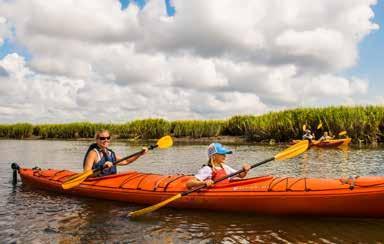 BY CEALIA ATHANASON
BY CEALIA ATHANASON



ountless sleepovers, kitchen-raids, midnight talks, crushes, shopping dates and last-minute cramming sessions are just a few of the memories you likely made growing up with girlfriends. Then, one day—after college, weddings, jobs, babies and maybe relocating—you and your friends are all grown up and don’t have endless summer afternoons to hang out anymore. Untangling schedules to grab co ee, catch a show or take a work lunch can be tricky, so occasional phone calls and drawn-out texting conversations become the norm. Sound familiar? We think it’s time to reunite for a weekend of laughter, fun times and new memories good enough to rival the old ones. We’ve done all the planning for you, so call the girls and pack your bags. Let’s get this show on the road.
A weekend of pampering at the beach with friends might bring imagery of a Sandals commercial to mind. That’s the type of getaway you need (and want), right? Get ready—a light ocean breeze during a Swedish massage is just the beginning. Your spa paradise is just a few hours south of the Central Florida area at Eau Palm Beach Spa and Resort on an island near Palm Beach. You’ll find an environment so fully immersed in tranquility that you and your friends will be able to easily recharge and reconnect for a

completely refreshing experience. Enter the spa, a beautifully designed area equipped with quite the assortment of spa treatments, and prepare to relax your body as well as your mind. Before and after each spa appointment, take

in the peace and quiet o ered in your own private garden villa. The salon, garden, scrub and polish bar, fitness center and treatments work together to create a soothing, stress-free atmosphere and experience.
This resort and spa has everything you and your friends need for a long weekend. Along with spa fun, your group can get active, too. Take tennis lessons, ride bicycles along the island’s Intracoastal Waterway, rent jet skis and dine at the resort’s fine restaurants. Enjoy a bit of nightlife at the

resort’s bar and the nightly lobby ‘turndown,’ involving champagne and music by candlelight. Enough already— let’s get your getaway booked.
When you arrive, you’ll be guided to the Wishing Well to light a candle and make a selfcentered wish before enjoying a glass of champagne and munching on cupcakes.
The Self-Centered Garden is a place to relax, dip your toes in the fountain and bond with your friends.
Spa treatments include di erent types of massages, body treatments and skin care options. With one spa treatment, you’ll enjoy full-day access to the spa. Without a scheduled treatment, you must purchase a day pass to enjoy the spa.
Designate one day as your group’s spa day. Relax in the garden; then, enjoy the lobby ‘turndown’ event that evening.
One morning, grab co ee and breakfast at the resort’s Breeze Ocean Kitchen before hitting the beach. Then, relax at the pool when things get too sandy.
Take a day to explore the area, hitting Worth Avenue a few miles up the island and City Place in downtown West Palm Beach.

Plan your trip in advance and during the summer months for a significant decrease in rates.
Consider splitting the cost of a Lanai Terrace Suite. There’s more than enough room for four, and the terrace opens out toward the ocean.
Use the itinerary planning feature on the resort’s website to make sure you hit all the hotspots.
Schedule spa treatments close together. Then, you and your friends can reconvene in the Self-Centered Garden.
Eau Palm Beach Resort and Spa 100 South Ocean Blvd, Manalapan (561) 533-6000 eaupalmbeach.com

If it’s the outdoors you and your friends enjoy, Little St. Simons Island has 11,000 acres waiting to be explored. The island is located o the coast of Georgia and requires a 15-minute boat ride to get there. It’s only about three and a half hours away from Central Florida locations. At full capacity, the island can accommodate up to 32 guests. The small setting is perfect for spending quality time together and finally having a peaceful retreat from life’s daily grind. Plus,

all outdoor activities, three meals per day and equipment are included in the cost of your stay.
The lodge and cottages have real rustic charm, and you and your friends can catch up around a fire in the evenings. Depending on the size of your group, choose to stay in separate guest rooms in the lodge or share a cottage. Cottages range from having one bedroom to four—with everything from living room spaces and fireplaces to bathrobes, wireless internet, refrigerators, washers and dryers, co ee makers and outdoor decks.
There are several naturalists on the island who lead guided interpretive walks, but you can grab a kayak or canoe and scout the wildlife on your own, as well. Seven miles of quiet, secluded beach are perfect for long walks, hunting for shells or riding bikes—outdoor adventure awaits.
Arrive at the lodge, settle in and explore a bit—dinner and a fire to follow.

Start your weekend with a naturalist-guided tour of the island, and finish o the day with the lodge’s social hour and

dinner before relaxing on your private deck.
Spend one day hiking, kayaking, fishing or boating. The island’s sta and naturalists will be able to give you tips and answer questions before you go.
Pick one day to spend at the beach or biking the island. Request a sack lunch one day in advance so you and your friends can enjoy a picnic together.
Be sure to book your stay well in advance. You’ll be able to plan out any detailed activities, meals and accommodations with the island sta .
Pack light. The island has all the equipment you’ll need for outdoor fun. There’s a fully stocked tackle shack for fishing, and the beach pavilion has umbrellas, towels, chairs, lotions and floats ready for you to use.
There is a twonight minimum stay requirement, and pricing is allinclusive.
Meals and social gatherings are held in the main hunting lodge.
Little St. Simons Island
1000 Hampton River Club Marina Drive, Saint Simons Island
(912) 638-7472
littlestsimonsisland.com
You don’t have to be a bunch of foodies to enjoy the Epcot International Food & Wine Festival. More than eating and drinking (although that’s the best part), the festival also has an entire concert lineup, culinary demonstrations, beverage seminars, cake decorating and mixology workshops, cheese seminars, beverage boot camps and special guest speakers. There are grand tasting events, festival packages to choose
from and even festival dining at Disney Resort hotels. You and your friends have a bit of flexibility when it comes to planning the getaway dates, as the festival runs from August 31 through November 13. Start planning now—his is a weekend for the friends who don’t stop.

Need a getaway, like, right now? Make plans to attend the Epcot International Flower

wildlife habitats and exhibits and attend seminars and demonstrations. You won’t go hungry at this festival either. Thirteen outdoor kitchen stations keep eats, desserts and specialty drinks available. And because you’re going for the weekend, you and your friends can enjoy the Garden Rocks Concert Series, too.
Plan to stay in one of the Disney Resort hotels. That

Have a girls’ day at Disney Springs. Go shopping, catch a movie, get dinner and stop by the House of Blues.
Don’t forget a lounge day with breakfast at the hotel and plenty of time at the pool. Finish the trip with one final night of fun back at Disney Springs catching Cirque du Soleil’s La Nouba.
The earlier you book your
& Garden Festival between March 1 and May 29. Take garden tours—filled with giant plant sculptures of your favorite Disney characters—explore
way, you can leave your car behind and take Disney transportation to the festivals and other Disney-area shows and attractions. Let’s get these details nailed down.
Spend one day taking in whichever festival you decide to attend. Go on a tour, catch a guest speaker or demonstration, and eat as much festival food as you want.

Plan a day for concerts, and maybe fit in a grand tasting or one of the festival’s special events.
hotel stay, the better. Call (407) 939-5277 for help making reservations.
Di erent festival packages are available depending on your group’s preferences. Be sure to check disneyworld.disney.go.com for more information.
Admission to Epcot will include most of the events in each festival, but a few things may require extra fees.
Visit disneyworld.disney.go.com to plan your trip.
Source: disneyworld.disney.go.com
For 25 years, we have been committed to creating an environment where our residents feel secure, cared for and loved. We would be honored to care for your loved ones in their time of need.
Services Offered:
In-House Psychiatrist
Podiatrist
Ophthalmologist
Dermatologist
Nurse Practitioner
Organized Social Activities
Church Services
Daily Living Assistance
We are currently accepting referrals
Assisted Living Facility
6333 SE Babb Rd. | Belleview, FL | 352-307-6333
prestigemanorassistedliving.com

 Carrol Dillon-Smith Administrator/Owner Megan Christine Forrest Director of Operations
Carrol Dillon-Smith Administrator/Owner Megan Christine Forrest Director of Operations
Age-related hearing loss a ects roughly 70 percent of individuals age 70 and older. Data, which was published in the Journal of Neuroscience, states that researchers believe age-related inflammation damages cells and capillaries that relate to hearing. Exercise may provide protection against such inflammation. So University of Florida researchers tested a group of mice, finding that the sedentary mice lost structures that are important to the auditory system at a much higher rate than their exercising counterparts. The sedentary mice su ered a 20 percent hearing loss opposed to a 5 percent hearing loss in active mice. The cochlear organ—responsible for processing sound—needs a huge amount of energy molecules, as well as a high source of oxygen to do its job. Did you hear that?

When you imagine living an organic lifestyle, what do you think of? Living in a log cabin without electricity? Raising your own livestock to eat? You can put your imagination to rest— no need for extreme measures. We’re going to help you ease into a more natural, organic lifestyle.
From what you consume to which cosmetics you apply, the ingredients found in these products often contain harmful chemicals. Eliminating such chemicals will obviously benefit your life as a whole. Here’s how to do it.

Produce products certified 95 percent or more organic display a USDA seal. This seal ensures that the farmers who grow these products don’t use conventional methods to fertilize and control weeds—natural fertilizers, crop rotation and mulch are used instead.
When considering switching to organic foods, the following items are a great place to start. You can also check out the Environmental Working Group’s (EWG) website at ewg.org for a more comprehensive list.
According to an EWG 2015 report, there are 300 pounds of pesticides applied to each acre of conventional strawberries.

APPLES
Any ol’ apple a day may not keep the doctor away. Apples have been deemed one of the most contaminated fruits by the EWG. Over 99 percent of the apples tested contained at least one pesticide residue.
DAIRY
Organic dairy ensures that the cows involved did not receive antibiotics or growth hormones. This goes for milk, yogurt, cheese, etc.
These blue treats carry over 50 pesticide residues.
When you can’t find organic celery, buy asparagus instead. Asparagus was at the top of the EWG’s clean list, while celery was found to have 64 pesticide residues.

The skin of the tomato was ranked 10th dirtiest, and the USDA Pesticide Program found 69 pesticide residues on this red fruit.
genetically modified. This means cornbased sweeteners, oils and starches in processed foods are all ingredients you will want to purchase organically. The same goes for popcorn.
CUCUMBERS

You can choose to buy organically or to peel the skin o before consuming these tasty veggies to avoid the 86 pesticide residues found on the outer layer. They ranked ninth on the EWG 2015 report.
Seventy-five pesticide residues were found on peppers. Chop an onion to throw into your recipe instead.

MEAT
Organic meat is free of synthetic fertilizers and herbicides found in cows, chicken, turkey and other animals.
LEAFY GREENS. Pesticides are tough to wash o . If you choose not to purchase organically, make sure to wash thoroughly.
The EWG 2015 report was based o a single round of grapes, testing positive for over 15 di erent types of pesticide residue.
Organic living not only begets better health for the person who is practicing it but to the Earth as a whole—home to all future generations.
Organic cleansers are preferred by those who have sensitivities such as asthma or allergies. Conventional cleaning products contain low levels of formaldehyde, which can lead to birth defects, not to mention plenty of other dangerous chemicals that may lead to a host of other health issues over time.
Check out these homemade organic cleaners that are safe to store around the house and are easy on the budget:
Add 1/2 cup distilled vinegar to a new spray bottle. › Fill with distilled water, gently shake. › Spray on mirrors and windows, and polish with a crumpled newspaper for minimal smearing.

Add 2 tablespoons of distilled vinegar and 1 teaspoon liquid castile soap (vegetable based and natural) to a new spray bottle. › Add 2 tablespoons of baking soda. › When it stops foaming, add 2 cups warm water, shake gently. Add a few drops of an essential oil if you prefer your cleaners to be scented.
Use on counters, kitchen and bathroom surfaces. Use an organic cleaning cloth.

Mix 1 cup baking soda and 1/4 cup liquid castile soap. › Add 5 teaspoons of vegetable glycerin and 5-10 drops tea tree oil. › Use a microfiber cleaning cloth to scrub sinks, tubs and other bathroom surfaces. › Rinse with hot water, and polish with a dry microfiber cloth.

For some women, makeup is a must. Chemicals, heavy metals and bacteria, however, are cause for serious concern in conventional beauty routines.
Mercury in skin creams. Carefully examine labels for listings of “mercurous chloride, “calomel,” “mercuric” or “mercurio.”
Lead in lipstick. Two consecutive FDA investigations found 100 percent of lipsticks tested were positive for lead.

Bacteria in mascara. After three months you should toss your mascara to help prevent bacteria buildup, leading to eye infections.
Here’s just a handful of all-natural brands to give you that all-natural glow without the unhealthy fillers.
› Dr. Hauschka drhauschka.com
› Living Nature Livingnature.com
› Inika inikaorganic.com
› Kjaer Weis kjaerweis.com
› Ere Perez ereperez.com
› Becca beccacosmetics.com
› BareMinerals bareescentuals.com
› Lemongrass Spa lemongrassspa.com
Consider how much you rely upon your eyes for daily life. Then tend to these important organs that help you see the world.
Eyeglasses help adjust a variety of sight issues. According to Dr. Mike Jank, ophthalmologist with Ocala Eye and Healthy Living Advisory Board member, by consulting your eye professional, you can learn the latest eyeglass advancements to significantly improve even normal, unchanged vision. He recommends asking about these features at your next exam:
According to a 2014 Nielsen Total Audience Report, Americans use electronic media more than 11 hours per day, making for intense cumulative viewing time.
“Glasses that filtrate and block harmful blue light from digital devices or fluorescent lighting can eliminate or vastly reduce resulting eye fatigue and strain,” says Jank.

“Another common situation is outdoor activity where sunlight exposes one to harmful UV rays and disabling glare. UV-blocking polarized lenses e ectively address both of these concerns.
“Thinner, lightweight, digitally ground lenses can correct for individually unique optical imperfections beyond simple nearsightedness or astigmatism, o ering what is popularly called high definition vision.”
And if perching glasses atop your adorable mug seems disconcerting, keep in mind, it’s highly fashionable these days to nerd out in specs.
We all know orange-colored produce like carrots and cantaloupes promote healthy eyesight through beta carotene, vitamin A and vitamin C. But how about tapping orange-colored concealer to freshen the darker under eye area? Makeup artists praise orange for beautifully neutralizing blue tones but suggest peach-orange for lighter skin (2B Colours stick, $8) and red-mango for darker complexions (Sephora Collection Bright Future liquid, $14).

lash limit: Although thick fringe may be ultra-glamorous, false lashes pose startling health risks: Adhesive allergies can produce redness and swelling, trapped dirt and bacteria can lead to possible eye infections. Another possible hazard is extra pressure from repeated improper application along the natural lash line could temporarily or permanently halt lash growth altogether. In short, use fakes sparingly for special occasions. WebMD points out that wearers are advised to not get these
falsies wet. Say what?! Here’s where brilliant coconut oil comes to the rescue. Nourishing properties keep lashes shiny, strong and supple, preventing breakage or fallout. It even serves as a gentle makeup remover.
You’ve probably caught on that the polished look of fuller eyebrows continues to dominate. And that makes sense given how they play a crucial role in framing eyes for every expression, not to mention
WUNDERBROW: a brush-on, smudge-proof semi-permanent enhancer boosts brow color and definition with a blend of pigment and hair-like fibers that lasts for three days. Check wunderbrow.com for a three-gram tube ($22).

facial recognition. But if daily augmenting with powders, brushes, pencils and waxes becomes a bear, try these long-lasting alternatives that stand up to Florida’s sweaty climes.
MICROBLADING: a semi-permanent procedure performed with a hand-held blade device comprised of di erent-sized needles etches pigment into skin to simulate brow hairs. Professionals may charge $500-$800, but results last for one-anda-half to two years, o ering another promising option for patients undergoing chemotherapy, alopecia loss or thyroid e ects.

Chocolate, chick-flicks, darts and pictures. Turns out the cure for a heartbreak includes more than what’s on this list—acetaminophen is also a remedy. In a study published in an issue of Psychological Science, participants were given a painkiller or a placebo for three weeks and then asked to record their emotions on a Hurt Feelings Scale to determine the extent of their social rejection each day. The group taking the painkillers had a significant decrease in hurt feelings. Researchers also performed
an MRI to measure blood flow activity in the brain and got the same results. Turns out acetaminophen can be used to treat social as well as physical pain, suggesting the regions of the brain that deal with feelings of social rejection and physical pain overlap. Remember, however, prolonged use of acetaminophen in high doses can cause liver damage, especially when mixed with alcohol, so we’d stick with the ever-popular chocolate and a night out with friends instead.

Turns out it takes a major toll on your health, both mentally and physically. Here’s what complaining hurts, head to toe, and how to knock it o .
Complaining and negativity cause a release of cortisol, everyone’s favorite stress hormone, which a ects nearly every part of the body. It interferes with immune functions, learning and memory; lowers bone density; and increases weight gain and blood pressure. Excessive cortisol release can also increase a person’s risk for diabetes, obesity and heart disease. Perhaps the scariest side e ect of complaining is that it can actually rewire our brains.
Electric charges pass from synapse to synapse when you have a thought, with certain synapses growing closer together over time as we have similar thoughts repeatedly. Those who complain often may soon find that negative thoughts pop into their minds much easier than positive ones once the brain has physically changed itself to accommodate the frequent negativity. In other words, complaining begets more complaining.
Complaining has its place: According to Eric Berne’s 1964 book Games People Play, most people do it for attention, sympathy or a way to bond over shared dislikes. Most importantly, it provides an emotional release. Those things aren’t bad, and we all need them; the problem arises when we never make our complaining work for us. If grumping about is so detrimental to health and productivity, how can we stop?
1. TRACK HOW OFTEN YOU COMPLAIN AND WHAT YOU COMPLAIN ABOUT. The amount may shock you into choosing your words more carefully, or you may notice one recurring complaint you can then tackle head on.

2. ABOUT MINDING YOUR WORDS, CHANGE THOSE “HAVE TO” CLAUSES TO “GET TO.” If you no longer “have to” go to the grocery store with the kids but instead you “get to,” you will sound (and maybe even feel) more appreciative.
3. DON’T SPEND TOO MUCH TIME WITH CHRONIC COMPLAINERS. You may find yourself stuck in their spiral and co-complain when you wouldn’t otherwise.
4. MOST OF US ASSOCIATE COMPLAINING WITH VENTING RATHER THAN PROBLEM SOLVING. Instead of complaining, head straight to the source of your issue and have a meaningful conversation, like chatting with your spouse about that annoying thing they do or talking to your manager about your impossible workload. Not only does this approach feel empowering, but it should eliminate the negative situation entirely. Boom: nothing to complain about!

Research suggests two people in conversation each complain about once per minute. Seems excessive, right?
The average person will sleep 229,961 hours in their lifetime. (If they sleep their allotted eight hours daily, that is.) Turns out, the right bedding may be key to this equation. Sleep away those hours wisely.
Blankets are everything. Here’s the di erence between a good and bad night’s sleep.
HOT AND COLD. “People seem to sleep best at temperatures between 62 and 70 degrees Fahrenheit,” says Alice Hoagland, Ph.D., director of Insomnia Services at the Unity Sleep Disorders Center in Rochester, New York. When the temperature falls too low, your sleep can be interrupted—same for too high of a temperature. Fabrics such as wool, cashmere and fl eece tend to overheat.
AH-CHOO. Allergens such as down-filled comforters may set o sneezing or runny eyes in some people, keeping them awake at night. Dust-mites are prevalent in a variety of bedding, too. Wash all blankets and pillowcases at least once a week in hot water to kill any bacteria or critters.
A few extra ZZZs never hurt anyone. Try out these common tricks.
TURN OUT THE LIGHTS This includes the television, laptops and phones. Even the smallest source of light can disturb slumber.
EAT EARLY. Heavy eating or drinking before bed results in frequent bathroom trips and potential heartburn. Avoid ca eine at all costs.
DROP A SCENT.
A small amount of lavender essential oil, applied to your big toe, may help you fall asleep quicker.
WEIGH IT DOWN. Weighted blankets are often used in psychiatric care as a tool to help people who are anxious or upset. The blankets may also help with sleep and relaxation. Fifteen to 30 pounds is the average recommended weight for adults. Check with your pediatrician before purchasing a weighted blanket for your child. Also check with your doctor before using one to discuss concerns related to respiratory, circulatory or temperature-regulation problems or if you are recovering from surgery.


BE A SOFTIE. Babies are more likely to fall asleep with skin-to-skin contact. Likewise, a gentle fabric against your skin will help you ease into a better snooze. Cotton is always a safe bet.
PICKING FAVORITES. “Regularly using a favorite blanket for sleep can help to develop a conditioned response so that sleep onset is quicker,” says Dr. Hoagland. Once you find a blanket that works for you—hold on to it. If you visit hotels or go on vacations often, consider bringing it along. Just don’t forget to take it back home!
The average person spends between four and five hours a day on their phone. Tallied up over the course of one year—more than 1,460 hours will have been stolen from our lives.
Research says this addiction to our devices is not just a ecting our own lives—it’s negatively a ecting the ones we love most. Yes, smartphones are putting our closest relationships in jeopardy.
In the study, published in the journal Psychology of Popular Media Culture, college sweethearts were asked to report on their own smartphone usage—how dependent they felt on their device and how much it would bother them to go without it for a day. They answered similar questions regarding their partner’s smartphone dependency.
The results were uncanny. Those who reported their partners to be distracted by their phones were the ones who felt their relationship was doomed. Why? One hypothesis—called the “Displacement Hypothesis”— suggested that time spent on smartphones replaces meaningful interactions with your significant other, weakening the relationship.
The same problem is evident in parentchild interactions. Dr. Jenny S. Radesky, a developmental pediatrician at the Boston Medical Center, studied parent-child interaction at fast-food restaurants. She observed over 70 percent of the adults used their phones during the meal. She took note of the delayed responses parents gave to their children when they tried to speak. Key to their development, children need to express themselves vocally to a parent— with their parent’s full attention.
What can we do to combat this addiction? Practice these tips to keep the real world and digital
SET A TIME LIMIT, AND STICK TO IT. Don’t spend an exuberant amount of time checking your phone. If you need a way to track your minutes, download Moment— Screen Time Tracker, available for iOS and Android, an app that helps balance your screen time. You can also check out the BreakFree app.
WHEN DRIVING, KEEP YOUR DEVICES OUT OF SIGHT AND REACH. Put your phone facedown beside you. Better yet, put it in the backseat.
PHONE STACK DURING MEALS. As an incentive to not use cell phones at dinner, the first person who reaches for their phone must do the dishes.

SET ASIDE A SCREEN-FREE
Think outside the screen. Have a baking day or a family board
CHECK EMAIL OR SOCIAL MEDIA WHEN THE KIDS AREN’T AROUND. Get your screen time fix before the kids get up, while they’re at school or after they go to bed. You will be less distracted when communicating with your children and able to
DON’T USE YOUR PHONE IN BED. You’ll sleep better and won’t be distracted.
UNPLUG AFTER WORK. Put down the phones, and turn o the laptop. This will improve your family relationship as a whole. Think of the habits and routines you’re

We know why our audience listens to our stations…because they LOVE THE MUSIC! So we avoid DJ chatter and deliver the greatest Top 40 and classic hits of all time, along with important information like news, sports and weather. As a result, our listeners listen longer!


The Nature Coast’s #1 hit music station
Classic Hits
Classic Hits



